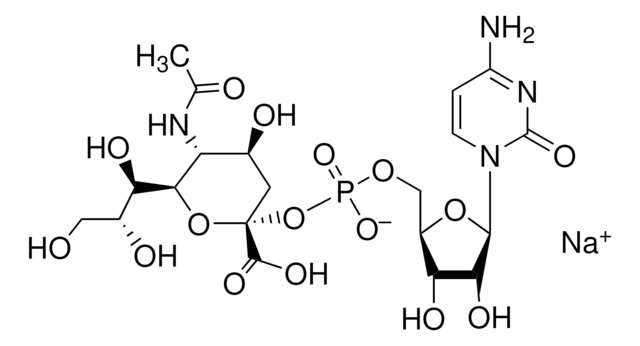D6000
2′-Deoxyadenosine 5′-diphosphate sodium salt
Synonyme(s) :
dADP
About This Item
Produits recommandés
Source biologique
synthetic (organic)
Pureté
≥95% (HPLC)
Forme
powder
Température de stockage
−20°C
Chaîne SMILES
[Na].Nc1ncnc2n(cnc12)C3CC(O)C(COP(O)(=O)OP(O)(O)=O)O3
InChI
1S/C10H15N5O9P2.Na.H/c11-9-8-10(13-3-12-9)15(4-14-8)7-1-5(16)6(23-7)2-22-26(20,21)24-25(17,18)19;;/h3-7,16H,1-2H2,(H,20,21)(H2,11,12,13)(H2,17,18,19);;
Clé InChI
KZGAPWRJMWSNQO-UHFFFAOYSA-N
Description générale
Application
Mention d'avertissement
Danger
Mentions de danger
Classification des risques
Acute Tox. 3 Dermal - Acute Tox. 3 Inhalation - Acute Tox. 3 Oral - Eye Irrit. 2 - Skin Irrit. 2 - STOT SE 3
Organes cibles
Respiratory system
Code de la classe de stockage
6.1C - Combustible acute toxic Cat.3 / toxic compounds or compounds which causing chronic effects
Classe de danger pour l'eau (WGK)
WGK 3
Équipement de protection individuelle
Eyeshields, Faceshields, Gloves, type P2 (EN 143) respirator cartridges
Certificats d'analyse (COA)
Recherchez un Certificats d'analyse (COA) en saisissant le numéro de lot du produit. Les numéros de lot figurent sur l'étiquette du produit après les mots "Lot" ou "Batch".
Déjà en possession de ce produit ?
Retrouvez la documentation relative aux produits que vous avez récemment achetés dans la Bibliothèque de documents.
Les clients ont également consulté
Notre équipe de scientifiques dispose d'une expérience dans tous les secteurs de la recherche, notamment en sciences de la vie, science des matériaux, synthèse chimique, chromatographie, analyse et dans de nombreux autres domaines..
Contacter notre Service technique












